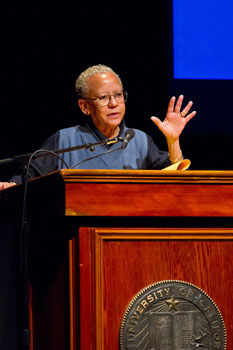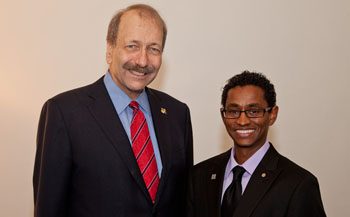Poet, activist and distinguished professor Nikki Giovanni had a crowd of nearly 1,000 people clapping, shouting and busting up laughing at the 28th annual Martin Luther King Jr. Convocation and 4th annual Tony Hill Awards.
Giovanni's presentation, a blend of historical memory, poetry, performance art, personal anecdote, call-and-response demands for action, stream-of-consciousness observations and irreverent comedy routine, was largely unscripted.
But Giovanni pushed a consistent message about resisting bigotry and mob mentalities, emphasizing individual responsibility while building a sense of community. In a broadside of her poem on display outside the auditorium, Giovanni pledged to "always choose to be the person running rather than the mob chasing."
She spoke of carrying on the dream of Martin Luther King Jr. without losing the ability to laugh along the way. To make this point, she re-imagined King as a hip-hop artist wearing a tattoo that says "Freedom Life" and rapping out the words "we have come to our nation's capital to cash a check."
Sitting with Rosa Parks
Giovanni's sly humor was consistent, whether she was reciting an extremely brief poem called "Note to the South" (the entire poem reads, "You lost") or recalling the first time she met Rosa Parks, who was sitting in a waiting area at an airport. Giovanni brusquely asked a man sitting next to Parks to yield his seat so she could have a few moments with the civil rights pioneer. "That man didn't have a clue as to who he was sitting next to," Giovanni remarked. "I just walked over with an attitude and stood in front of him. I said, "You gonna move or what?"
As it turned out, Parks was familiar with Giovanni's poetry. The two became fast friends. Giovanni linked Parks's enormous impact on the civil rights movement to her personal humility and her circumstances; at the time of her arrest for refusing to yield her bus seat to a white customer in the segregated south, Parks was a 42-year-old seamstress who lived in the projects.
If she were younger and well off, and if she had any option other than riding the bus, the indignation would not have been so widespread, Giovanni said. The outcry came forth from the projects and the "juke joints," she said.
Giovanni said Parks's bravery, dignity, and grace—she famously told the police, "You may do so" when they threatened her with arrest—opened doors for other pioneers including Martin Luther King Jr. himself. But she also humanized her friend by recalling Parks's almost excessively polite manners; the first time Parks called Giovanni, she asked if the professor and poet were "too busy" to speak with her.
Tracing the movement
Giovanni reminded the crowd that King's reign as a Civil Rights leader was brief—he rose to prominence in his 20s and was cut down by an assassin's bullet when he was just 39. "Really, we only had him for 13 years," she said. But Giovanni placed King in the middle of a living movement that she traced back to Henry David Thoreau's civil disobedience and his night in jail in 1846—he was protesting the U.S. war on Mexico by refusing to pay taxes.
Then she traced the movement all the way up to the present day, when anti-immigration and anti-gay rhetoric have led to new fronts in the civil rights battle. Like Thoreau and King, she called for a strong sense of individual responsibility and community: "We're living in difficult times," she said. "And if we can't count on each other, what is the point of being a human being?"
Her closing poem was featured in the Smithsonian's traveling exhibit, "In the Spirit of Martin: The Living Legacy of Dr. Martin Luther King Jr." The poem—like her remarks—was a sensory tour through black history, from Montgomery to Birmingham and Selma, from the "swirling Mississippi" to the "Tennessee dust," and concluding with the words:
This is a sacred poem…open your arms…turn your palms up…
feel the Spirit of Greatness…and be redeemed
Soon afterward, Santa Cruz Mayor Don Lane presented her with a key to the city "so you will come back again and use it," negating Giovanni's joking comments that she would "never be invited back again" because of her edgier comments.
Tony Hill Award
Also at the convocation, UCSC officials presented the fourth annual Tony Hill Award to Deutron Kebebew (Kresge '03, electrical engineering), who grew up as a foster child and became a passionate advocate for foster children throughout Santa Cruz County, encouraging their growth and development as well as their readiness for full-time careers and college educations.
Currently, Kebebew, who was born in Ethiopia and now resides in Watsonville, is project director for PAPAS, a Santa Cruz County-based organization that supports fathers' active involvement with their families.
The Tony Hill Award committee cited Kebebew's commitment to mentorship, mediation, and bridge building—three values that guided the life of community activist Tony Hill, who died in 2007 at age 62.
Melanie Stern, Hill's widow, described Kebebew's integrity, passion, and ability to overcome obstacles. "He is relentless, a word I would also use to describe Tony."
Coincidentally, Kebebew turned 35 on the day of the ceremony—he briefly lost his composure when the crowd burst into "Happy birthday to you" before he made his remarks.
After blessing "the people in my life who invested their time, energy, and unconditional love," Kebebew turned his attention to those who don't have the kind of support system he received.
Fatherless homes
Citing some alarming statistics—for instance, one out of three American children live in fatherless homes—he asked the crowd to join him on his quest to address the "physical, mental, and emotional" absence of too many fathers from their children's lives.
Kebebew received $500 to donate to the charities of his choice. He chose the Smith Renaissance Society Scholarship Fund, CASA of Santa Cruz County, Watsonville Rotary Club Scholarship Fund, and PAPAS.
In his remarks, UCSC Chancellor George Blumenthal urged the many middle and high school students in the audience to aim for college. "If your parents didn't go to college, what I say to you is, 'Don't worry. Mine didn't either!" Blumenthal noted that 44 percent of UCSC's freshman class would be the first in their families to earn a four-year college degree.
He then turned his attention to Martin Luther King Jr. "If he were alive today, my guess is he'd be leading the call for economic equality," said Blumenthal, urging audience members to make their voices heard. "Don't sell his memory short by sitting on the sidelines. Get involved."
The evening also included opening remarks by UCSC associate professor of history David Anthony and a dramatic performance by the African American Theater Arts troupe, a student-based organization.
See Also




